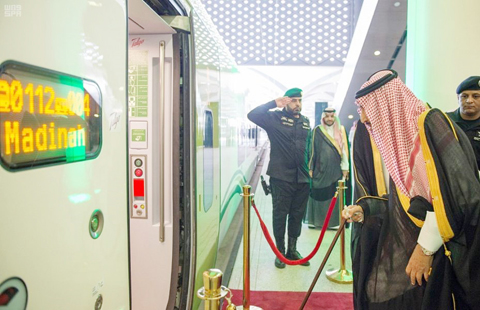 JEDDAH: Saudi King Salman inaugurates a high-speed railway linking Makkah and Madinah yesterday. — KUNA
JEDDAH: Saudi King Salman inaugurates a high-speed railway linking Makkah and Madinah yesterday. — KUNA
JEDDAH: Saudi Arabia's King Salman yesterday inaugurated a €6.7 billion ($7.87 billion) high-speed rail linking the two holiest cities in Islam, part of efforts to boost tourism revenues as the country seeks to shed dependence on oil exports. The 450-km Haramain Railway connecting Makkah and Madinah with the Red Sea coastal city of Jeddah is one of the largest transport projects in the Middle East, targeting nearly 60 million passengers annually. Commercial operations are set to begin next week.
"The journey between the haramain (two holy mosques) is now shorter and easier than at any time before," Transport Minister Nabil Al-Amoudi told dignitaries gathered at the Jeddah station. "The project highlights the kingdom's commitment to serving Islam and Muslims." Pilgrimage is the backbone of a plan to expand tourism under economic reforms announced two years ago by Crown Prince Mohammed bin Salman to diversify the economy.
The hajj, a journey every able-bodied Muslim who can afford it must perform once in a lifetime, can be a profound experience. It is also big business for Saudi Arabia. The hajj and the year-round lesser pilgrimage, umrah, generate billions of dollars in revenues from worshippers' lodging, transport, gifts, food and fees. The new rail link was built by a Spanish-led consortium and financed by the kingdom's sovereign wealth fund, the Public Investment Fund. It halves travel time between Makkah, the spiritual heart of Islam, and Madinah, its second most sacred site.
Project manager Mohammed Fallatah said the train would offer fast and reliable transportation to pilgrims as well as Saudis and foreign residents. "The traveller will be comfortable. He can read books or magazines or enjoy watching the screens in business class, have a coffee or a light meal," he said in an interview ahead of yesterday's ceremony. The authorities hope the train will also stimulate growth of King Abdullah Economic City (KAEC), a massive business zone that was initiated under the previous ruler but remains relatively empty. It will eventually link up with a new terminal at Jeddah airport, which has already started serving select domestic routes and will take over all flights by early next year.
Fatallah said further expansion could include connecting to a planned east-west train between the capital Riyadh and Jeddah. Pilgrims comprise the bulk of Saudi Arabia's 20 million annual foreign visitors, apart from workers and business travellers. More than two million came for this year's hajj and 6.5 million performed umrah in 2017. Officials aim to increase the number of umrah and hajj pilgrims to 15 million and five million respectively by 2020, and hope to double the umrah number again to 30 million by 2030.
In addition to public transit, Saudi Arabia is investing tens of billions of dollars in mega-hotels and a Grand Mosque restoration in Makkah. The Faisalia project, running from the edge of Makkah towards the Red Sea, aims to attract visitors to coastal getaways and Islamic research centers. Makkah governor Prince Khalid Al-Faisal, a nephew of the king and one of his closest advisers, anticipates that the initiatives will contribute to social and cultural development alongside economic growth. "We do not seek only to expand and develop. We want to expand and develop with distinction," he said in an interview. "We want to begin from the point that others have already reached, not the point from which they began."
Meanwhile, Saudi Arabia will offer an electronic visa for foreign visitors to attend sporting events and concerts from December, the kingdom said yesterday, as it tries to diversify its economy and open up its society. At present, foreigners travelling to the conservative Muslim country are largely restricted to resident workers and their dependents, business travellers, and Muslim pilgrims who are given special visas to travel to holy sites. Plans to admit significant numbers of tourists from abroad have been discussed for years, only to be blocked by conservative opinion and bureaucracy.
Crown Prince Mohammed is seeking to develop new industries to wean Saudi Arabia off dependency on oil exports. Economic reforms aim to lift total tourism spending in the country - by local citizens as well as foreigners - to $46.6 billion in 2020 from $27.9 billion in 2015.
"Saudi Arabia will open up its borders to fans of live sport, music and culture for the first time with the launch of a new online visa process dedicated to welcoming international tourists," the kingdom's General Sports Authority said. The "sharek" visa process will be introduced for a motor race on Dec 15, according to a statement by GSA. No other details were immediately available. "We hope the Saudia Diriyah E Prix will see fans from around the globe come to Saudi Arabia to watch this epic sporting spectacle as now your ticket is your visa," said Prince Abdulaziz bin Turki Al-Faisal, vice chair of the GSA.
In Aug 2017, the kingdom announced a multi-billion dollar project to turn 50 islands and other pristine sites on the Red Sea into luxury resorts. The country also plans to develop historic sites such as the centuries-old Mada'in Saleh, home to sandstone tombs of the same civilization which built the Jordanian city of Petra. - Agencies









